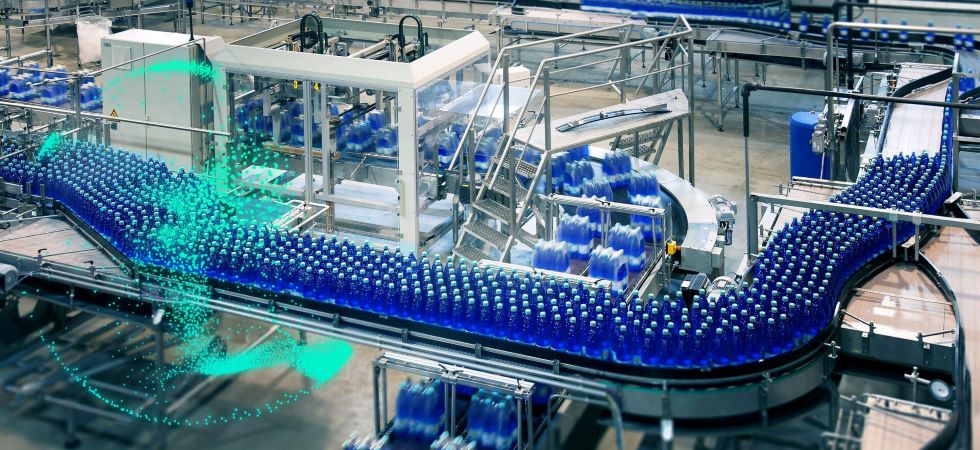SPECIAL FEATURE – Long read: The future food factory
A new research paper from Siemens has called for a cultural shift in collaboration between food and drink manufacturers and machine builders to create a future factory.
The research paper being revealed at Hannover Messe in April, is based on a quantitative and qualitative survey and interviews with 25 of the UK’s leading food and beverage manufacturers, along with the machine builders who provide them with the technology for production and packaging.
The report Collaborating to Create the Future Factory for Food and Beverage Manufacturers comes against a backdrop of Brexit, the climate crisis, a national skills shortage, and a global pandemic which have coalesced to create unprecedented levels of pressure on the food and beverage industry.
Manufacturers accept that accelerating digital transformation and maximising the value of data are central to tackling the challenges of driving up productivity and efficiency, while bringing down costs.
Meanwhile machine builders recognise they have a pivotal role to play in this shift – supporting end users with greater machine performance and roadmaps for the future.
The white paper suggests five key areas where the two groups and technology providers like Siemens can bridge silos of innovation and best practice and find the sweet spot for collaboration.
- Data-driven innovation: ways of capturing information and using it to innovate production and processes – example: digital twins, simulations, scenario planning;
- Combining people, process and data: frameworks for assessing the need, understanding impact and then managing change;
- Finance: budgeting and optimising the costs of innovation;
- Joint vision for sustainability: sharing best practice and innovation from across the industry and supply chains;
- Going beyond the food and beverage industry: sharing best practice from other heavy heat and energy users.
Keith Thornhill, head of Food & Beverage UK and Ireland, Siemens Digital Industries, said: “The findings have put the finger on the pulse of the UK food and beverage manufacturing industry.
“As providers of innovative solutions in digitalisation and automation, we have been working closely with manufacturers, machine builders and other technology providers to continuously improve their operations for the digital future.
“This survey enabled us to bring together all stakeholders and thus take the UK food and manufacturing industry to the next level.”
The report’s findings resounded what many industry experts have been saying for the last few years; that even before external factors such as Brexit and Covid-19, the food and beverage industry was already buffeted by factors like aging infrastructure and rising costs.
Increased innovation and performance key
The manufacturers Siemens spoke to collectively recognise that innovation and greater machine performance will be critical to their future success.
While half (51%) of manufacturers put quality of output as the top concern, they also want to be able to withstand disruption, adapt faster to change, and hit growing sustainability targets.
Resilience was also a key concern with 94% of the food and beverage manufacturers acknowledging that it was discussed more frequently in leadership meetings and planning than it was five years ago.
The research suggests that improving business resilience, machine performance and production agility is a growing concern for food and beverage manufacturers facing supply chain risk, demand fluctuation, and production challenges. Findings show that even a brief downtime can have serious and wide-reaching effects, meaning there’s strong industry appetite both for improved diagnostics, proactive and preventative maintenance of machinery. This approach can limit unpleasant surprises by identifying potential machine failures and resolving issues before they occur.
Support needed
The survey discovered that manufacturers need support not only with machinery and software that facilitates automation, but with people and process training.
One way of doing this is to improve machine resilience and extend equipment life cycles; many of the manufacturers are looking to sweat their assets more effectively to avoid the need for costly new kit. Doing this successfully requires better maintenance and understanding of asset health – which in turn demands not only better HMIs and dashboards with smarter integrations and greater visibility of machine data, but also the skills and experience to understand and respond to that data at speed.
Sustainability
Another key finding pertains to sustainability which is high on the agenda of the manufacturers, with more than three quarters (81%) strongly agreeing that it will receive much more focus in the coming years.
This will enable them to respond positively to decarbonisation target and have the ability to transform energy use. Packaging too is rapidly evolving into a central issue for suppliers and consumer food and beverage brands alike.
As far as innovation goes, food and beverage manufacturers are reaching the end of the road with conventional efficiencies for energy and downgauging for packaging. Having done all they could, the onus is increasingly on machine builders and other technology providers to help manufacturers reach the next stage of sustainable productions.
The white paper reveals that digital transformation and use of data hold the key to success of the industry.
Siemens’ research shows manufacturers are keen to both utilise it effectively, and embrace digitalisation more widely, but they face serious challenges in gathering, analysing and reacting to data effectively.
Half (50%) of the manufacturers are in the early stages, with an additional 38% only somewhat mature. Some have limited data visibility, with interfaces that make data gathering difficult to manage, while others have an abundance of data but no real sense of what to do with it.
There’s also anxiety about what growing automation means for certain roles and the absence of relevant skills in the workforce.
The paper says: “With so much complexity to wade through – and with technology, people and process challenges to untangle – food and beverage manufacturers need support if they’re going to succeed. Machine builders and other industry tech providers have an important role to play.”
Among the items of support listed by manufacturers are: more guidance and visibility of their digital strategy for assets; service support and training; more collaboration on product development and roadmaps; guarantees that assets with be kept up to date with digital factory norms and connectivity over their lifecycle and guarantees on KPIs.
As far as machine builders are concerned, the survey says they are some way off being able to collaborate with manufacturers on all of their strategic goals. They feel they can offer guidance and visibility of digital strategy for assets, and assurance that assets will be kept up to date with factory norms and connectivity over their lifecycle.
“The challenge for OEM manufacturers is the industry’s ambitions around the data-driven factory of the future, because there is a general shortage of data and analytics experts in the industry, thus frustrating the efforts of machine builders,” said Rich Fear, Head of OEM UK & Ireland, Siemens Digital Industries.
The paper indicates that with manufacturers producing more data, machine builders are looking to support them with utilising this information effectively.
Conclusion
The overall conclusion is that machine builders are working hard to innovate and accelerate digital transformation – all the while moving towards an operational model that enables everyone across the industry to collaborate for better outcomes. However, there are still hurdles to be jumped on both sides – such as talent shortages, facilitating collaboration, and even financing the necessary transformation.









